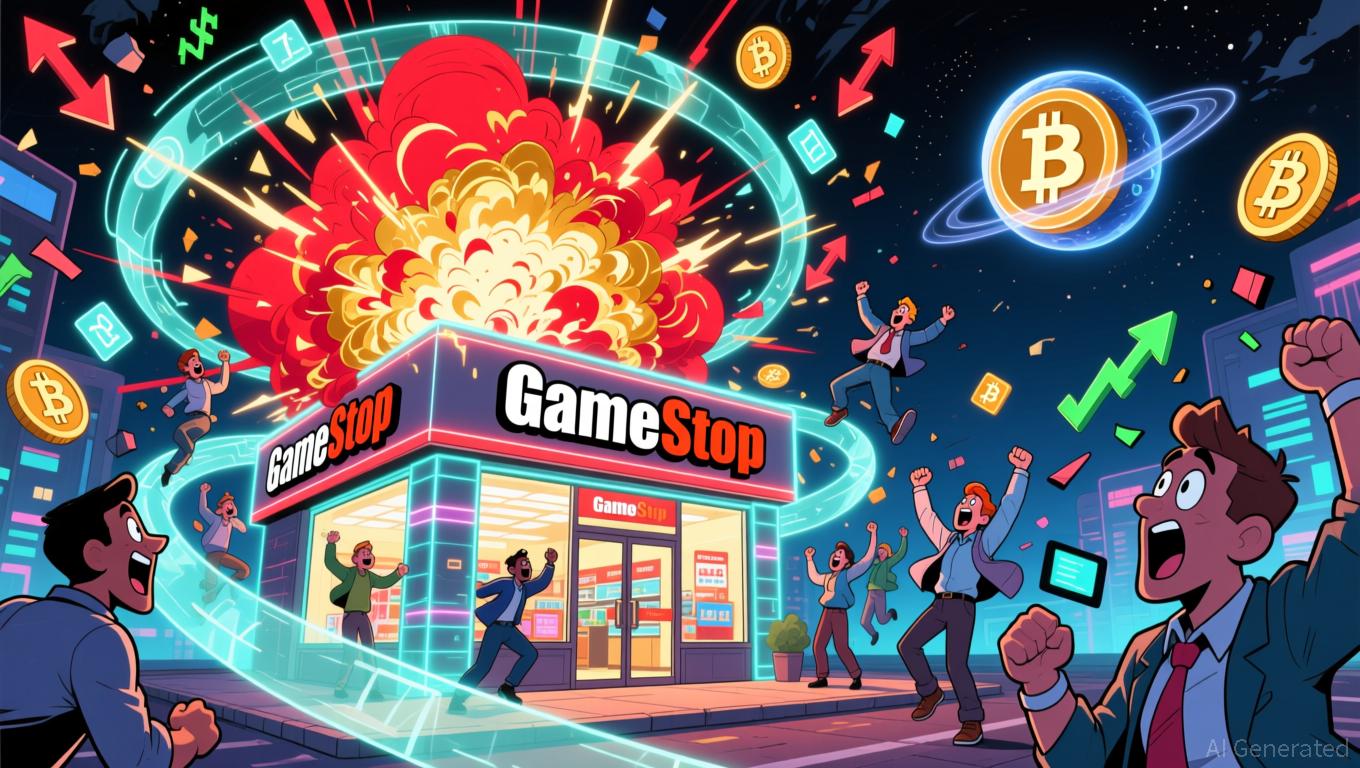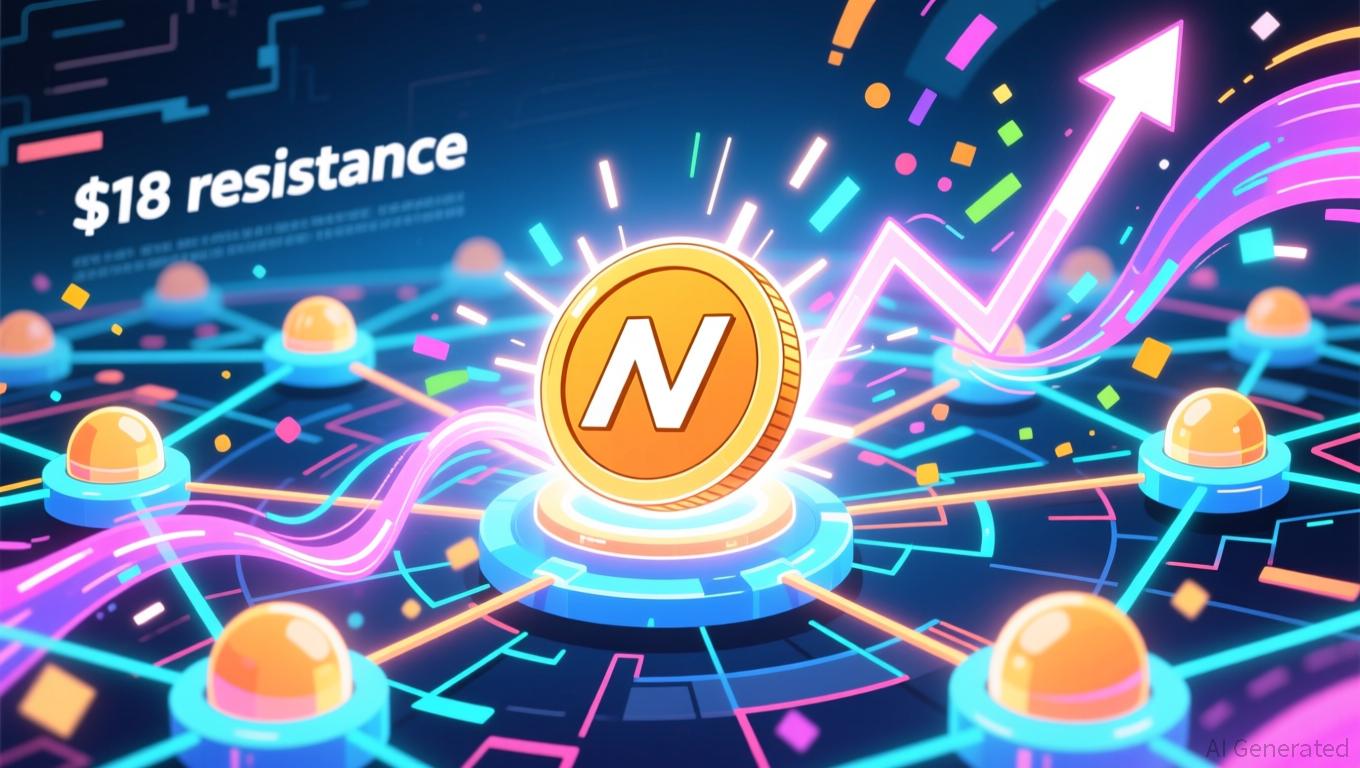GameStop's Profit Strategy: Short Sellers, Brick-and-Mortar Stores, and Interest Rate Expectations Intersect
- GameStop (GME) shares rose near 52-week lows amid high short interest and retail-driven speculation, with a potential short squeeze looming as open options activity surged. - Institutional investors cut $5.4B in MicroStrategy (MSTR) holdings, linking crypto-focused MSTR to GME's 2021 meme stock dynamics amid MSCI index exclusion risks. - A December Fed rate cut (85% probability) could boost retail spending and speculative appetite, countering bearish positioning despite GME's 21.8% Q3 revenue growth. - A
GameStop Shares Gain Momentum Amid Market Speculation
GameStop Corp. (GME) has recently experienced a surge in share price, fueled by increased options trading activity as its earnings announcement approaches. Both investors and analysts are monitoring the stock closely for any indications of a short squeeze or a broader rally driven by retail traders. On November 24, GME traded just above its 52-week low of $19.93, buoyed by optimism in the retail sector sparked by talk of a possible Federal Reserve rate cut in December.
Short interest in GameStop remains high, placing it among the most heavily shorted large-cap stocks, according to NASDAQ figures. This creates a highly volatile environment, where a sudden price jump could set off a wave of buying as short sellers rush to cover their positions.
Institutional investors have been quietly reducing their stakes in GME. In the third quarter, major firms such as Vanguard, BlackRock, and Fidelity collectively trimmed $5.4 billion from their holdings in MicroStrategy (MSTR), a company often compared to GameStop due to its involvement in the 2021 meme stock phenomenon. While MSTR’s decline is partly attributed to MSCI’s consideration of removing crypto treasury firms from its indexes, broader market forces—including stricter margin requirements and risk controls among institutions—have also impacted retail-oriented stocks like GameStop.

GameStop’s recent stock movements have been shaped by a mix of economic trends and speculative trading. The company saw a temporary 7.5% boost in October after a viral White House post, featuring President Donald Trump, promoted its “end of console wars” campaign. Meanwhile, Point72 Asset Management, led by Steven Cohen, increased its put options on GME, reflecting ongoing doubts about the company’s turnaround despite notable revenue growth. GameStop reported $972.2 million in revenue for the third quarter, a 21.8% increase from the previous year. Nevertheless, analysts continue to recommend reducing exposure to the stock, with an average price target of $13.50.
Options market data highlights the heightened anticipation surrounding GME. Both open interest and trading volume for its options have climbed, as traders position themselves for potential gains or losses. The futures market currently assigns an 85% probability to a December rate cut, which could ease pressure on consumer spending—a crucial factor for GameStop’s business—and potentially revive speculative interest. Historically, lower interest rates have encouraged risk-taking, which may counteract the prevailing bearish sentiment in the stock.
On a broader scale, the market is witnessing a pushback against established financial institutions. Supporters of Bitcoin have urged a boycott of JPMorgan after the bank warned that MicroStrategy could see $8.8 billion in outflows if excluded from MSCI indexes. Although this development directly affects MSTR, it has reignited the debate between institutional and retail investors, drawing comparisons to the GameStop saga of 2021. This renewed narrative, combined with GameStop’s upcoming earnings release on December 9, could contribute to further volatility.
Looking ahead, GameStop’s future remains uncertain. The company’s fundamentals are solid, with annual sales approaching $3.85 billion and a strong cash position. However, its stock performance will likely depend on broader economic trends and the mood of retail investors. Analysts at Benzinga Edge point out the disconnect between GameStop’s robust growth figures and its lackluster share price, suggesting that a positive earnings surprise could mark a turning point for the stock.
Disclaimer: The content of this article solely reflects the author's opinion and does not represent the platform in any capacity. This article is not intended to serve as a reference for making investment decisions.
You may also like
Bitwise's BAVA ETF: AVAX’s Gateway for Institutions Featuring Zero Fees and Staking Rewards
- Bitwise's BAVA ETF for Avalanche (AVAX) offers 0.34% fees, lower than competitors, with waived charges for the first month or $500M AUM. - The ETF integrates AVAX staking rewards and institutional infrastructure, including Coinbase Custody and BNY Mellon, marking a U.S. crypto first. - AVAX rose 7% toward $18 resistance as Europe's Securitize secured EU approval for Avalanche-based tokenized securities, boosting institutional adoption. - With $2.5M in seed capital and $6.41B market cap, AVAX's 2026 outlo

Pi Network (PI) Retesting Its Key Breakout – Could a Rebound Be Near?

Bitcoin News Update: Bitcoin Drops 30%, Revealing 'Panda Phase'—A Mild Bear Market Lacking a Definite Bottom
- Bitcoin fell 30% to $87,080, its steepest two-month drop since 2022, driven by ETF outflows, leverage liquidations, and stablecoin declines. - Institutional confidence waned as asset managers paused accumulation, while retail investors exited en masse, worsening liquidity and market sentiment. - The Crypto Fear & Greed Index hit record lows at 15, reflecting panic amid Fed policy uncertainty and Bitcoin's 0.72 correlation with the Nasdaq 100. - Deribit's $1.76B call condor bet hints at cautious optimism,
Lowe's CEO's Approach to DEI: Embedding Diversity into Operations Rather Than Symbolic Actions
- Marvin Ellison, former Target part-timer and one of eight Black Fortune 500 CEOs, led Lowe's to $20.81B Q3 revenue through operational discipline and AI-driven innovation. - His Total Home strategy integrating services and store productivity, plus 50+ AI models for inventory/price optimization, drives growth amid retail challenges. - Ellison prioritizes action-based DEI reforms like leadership-focused hiring over credentials, rejecting performative gestures post-2020 George Floyd protests. - Despite rais
